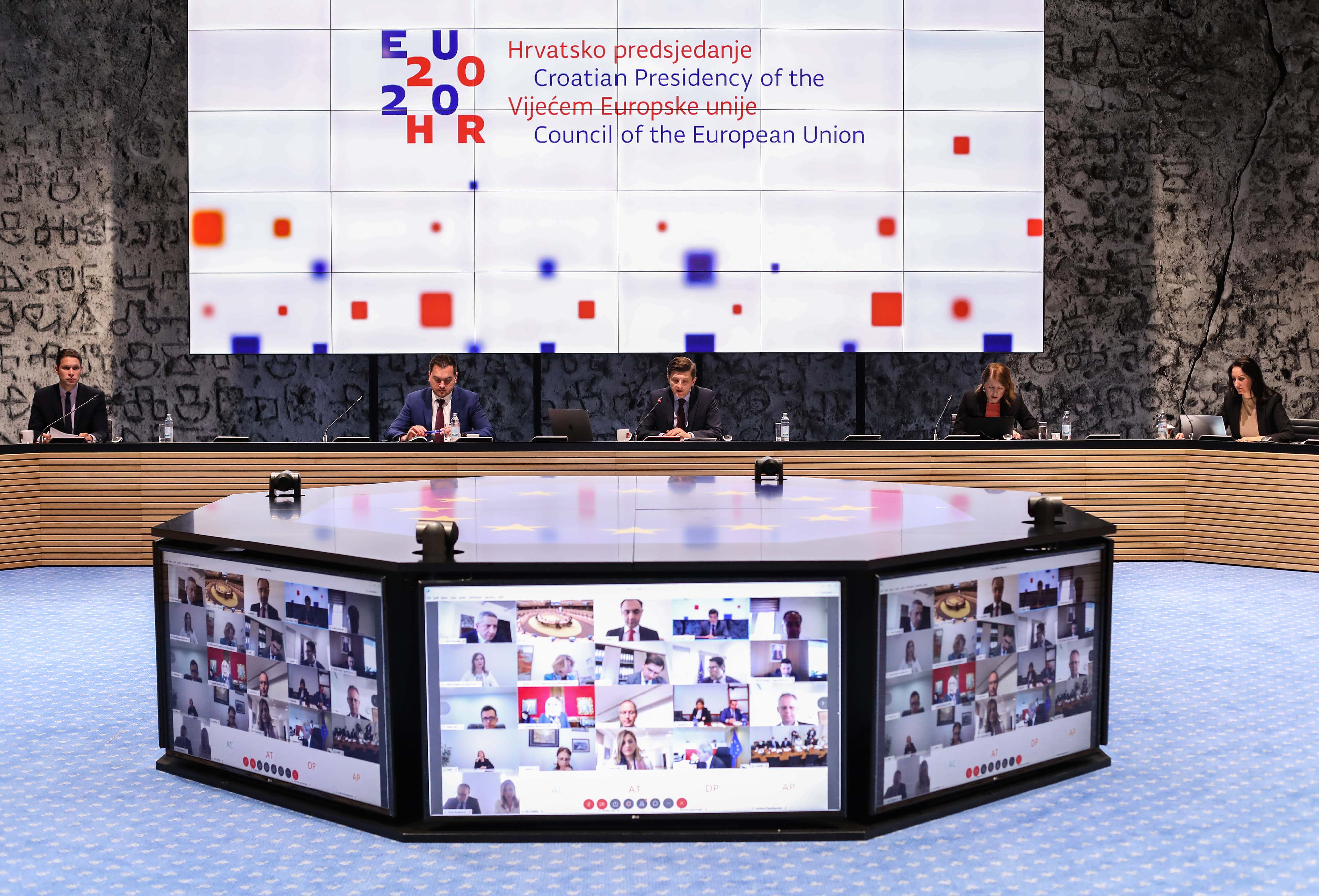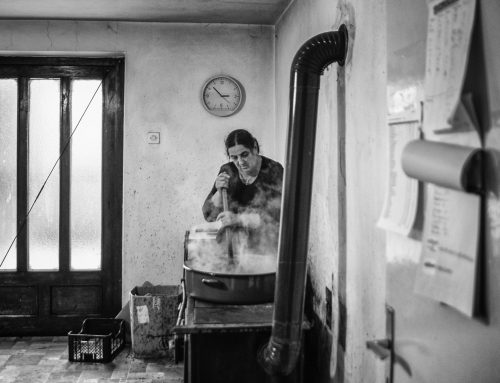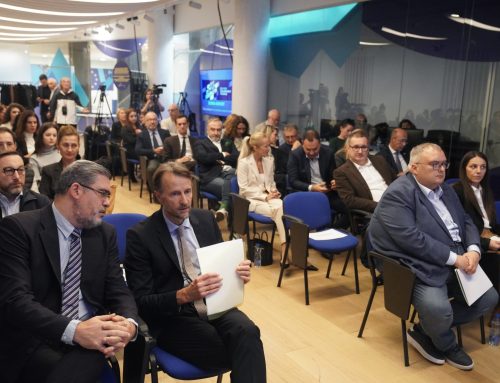Economic Reform Programme: Ministerial Dialogue with the Western Balkans and Turkey focuses on Covid-19 – EU encourages Serbia to reinforce medium-term sustainability of public finances, improve fiscal governance vigilance, restructure state-owned enterprises and step up structural reforms.
The representatives of the EU Member States, the Western Balkans and Turkey, the European Commission and the European Central Bank, met today in Brussels for their annual economic policy dialogue. The meeting was also attended by European Commissionaire for Economy, Paolo Gentiloni. This year, the meeting focused in particular on the needed measures to tackle the aftermath of the Covid-19 economic consequences. Serbia’s pre- Covid-19 macroeconomic policy was assessed positively, in particular the robust pace of economic growth of 4.2% in 2019, decreasing public debt ratio, and a broadly balanced budget. However, the growth momentum was abruptly interrupted by the Covid-19 pandemic impact. Major discretionary fiscal and monetary measures were taken to cushion the impact of the pandemic on the economy and employment.
Despite the adequacy of the immediate Covid-19 response, the pandemic exacerbated structural weaknesses and highlighted the strong need for effective and well-coordinated structural reforms that will mitigate the impact of the pandemic and accelerate economic recovery. In that context, the government’s policy response is critical in shaping the post-crisis economy, and will benefit from further efforts in tackling corruption, improving the rule of law and strengthening institutions and social dialogue. The main challenges towards successfully mitigating the possible long-term negative economic consequences of Covid-19 are linked to strengthening the underfunded public health sector, preserving employment and improving social protection, enhancing business environment and providing support to the private sector.
In the light of the above assessment, Serbia and the EU agreed on six recommendations: (1) further mitigate the impact on growth and employment by allowing appropriate discretionary fiscal measures; (2) support economic recovery by further increasing growth-oriented capital spending as a share of GDP in 2020 and over the medium term; improve the governance of state-owned enterprises including via further restructuring; (3) closely monitor financial stability challenges arising as a result of the coronavirus pandemic and take appropriate action; (4) ensure effective, transparent and non-discriminatory support to affected businesses, in particular micro, small and medium-sized enterprises and self-employed; (5) take measures to preserve employment through short-time work schemes and effective active labour market policies; provide minimum income and a short-term unemployment compensation schemes for laid-off workers to mitigate the social impact of the economic downturn; and (6) step up social transfers to ensure adequate income support for people at poverty and social exclusion risk.
Serbian Minister of Finance Siniša Mali said: “The Republic of Serbia has readily welcomed the crisis caused by the coronavirus, with low public debt, high foreign exchange reserves and a budget surplus for the fourth year in a row. That is why we had the space to help our economy in the right way, so that it could get back on its feet as soon as possible. The program of economic measures to support businessmen is worth 5.1 billion euros, which is as much as 11% of our GDP. One of the main goals was to maintain full employment and I think we succeeded in that. We have deferred taxes and contributions on salaries, we pay three minimum salaries for employees in the private sector, and businesses also have cheap liquidity loans at their disposal through the Development Fund and through the guarantee scheme with commercial banks. We have an excellent response, so I think we have hit the point with these measures. Also, in the first quarter of this year we have projected GDP growth of about 5%, so we believe that we can end this year with a minimal decline in economic activity, maybe even to zero, and return to high growth rates next year”.
Sem Fabrizi, EU Ambassador to Serbia stressed that “the Covid-19 pandemic outbreak led to unprecedented public health shock that turned into an economic and social crisis. In face of the pandemic, the EU has swiftly mobilised its solidarity mechanisms with partner countries by providing immediate medical and financial assistance. Thanks to TeamEurope engagement, a robust and targeted €3.3 billion financial support package has been put at disposal of the region to address the immediate health and humanitarian needs and support the economic recovery. In the longer term, the recent EU WB Summit in Zagreb has announced the Economic and Investment Plan for the region which will be announced later this year. The plan will include an investment package for Serbia. The positive effects on the recovery from the current crisis will be seized by delivering upon the reform commitments, and tangible results in their implementation produced. Some of the main challenges, highlighted already in the past remain, such as strengthening the rule of law, reducing the high share of informal economy and providing a modern and transparent economic governance. We will overcome the economic consequence of the Covid-19 pandemic – by joining our forces together.
Governor Jorgovanka Tabaković expressed satisfaction with the assessment that in 2019 the NBS continued to implement monetary policy in accordance with the inflation targeting regime. “Inflation in Serbia is low and stable for the seventh year in a row, which is a concrete confirmation that our monetary policy is appropriate. We have drastically reduced the NPL share, business conditions in Serbia have improved significantly, with evident healthy growth in lending”, stated the Governor. “Corporate loans have been rising at two-digit rates for the last several years already, with two-thirds approved to micro, small and medium-sized enterprises. Dinarisation remains one of our priorities, particularly dinarisation of loans to enterprises. Dinar lending to enterprises has never been more favourable. As a result of our measures, the spread between interest rates on dinar and FX corporate loans narrowed multiple times”, recalled Governor Tabaković. “Our projection of economic growth of minimum 6% in 2021 suggests that, owing to the measures implemented, we expect Serbia to fully recover from the effects of the pandemic already next year. We can state this with certainty as we faced the crisis with a stabilised economy, low inflation, sound public finances and record high FX reserves”, concluded the Governor.




